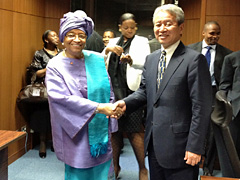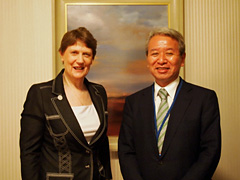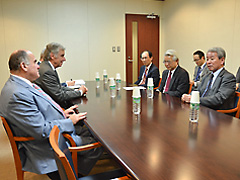JICA President Akihiko Tanaka met top leaders of development partners and organizations to discuss issues ranging from Africa, Myanmar, climate change and Post 2015 during the recent IMF/World Bank Group Annual Meetings in Tokyo.
The Japan International Cooperation Agency is Japan’s major comprehensive development institution and as such the development issues raised and discussions made at the Oct. 9-14 IMF/World Bank Group Annual Meetings are all relevant and important for JICA’s ongoing global activities.
President Tanaka, who assumed the JICA presidency in April, took the opportunity of the gathering of the world’s finance ministers and central bank governors to meet them to review the more pressing development issues.
In recent years, JICA has increased its financial and technical resource allocations to Africa, and Japan in June 2013 will host the 5th Tokyo International Conference on African Development (TICAD V).
Tanaka said energy issues would be an important pillar of that conference and in talks with his counterpart Tanja Gonner, Chairman of the Management Board at Germany’s government development agency, GIZ, the two organizations agreed to discuss a potential joint presentation.
JICA and GIZ have deepened their ties in cooperation in water sector and JICA has promoted many projects in energy saving and renewable energy front including hydro, solar, geothermal and wind power.
Gonner said Germany had “geared up for (further) electrification projects for Africa.”
Liberian President Ellen Johnson-Sirleaf thanked JICA for its assistance in reconstruction of the war-battered capital, Monrovia. JICA is currently conducting surveys for two upcoming projects for power supply and road expansion in the capital, where urbanization and population increase presents a pressing need for infrastructure development.
Africa’s urbanization, in fact, represents one of the continent’s major challenges. It recently passed one historic landmark when Africa’s population exceeded one billion for the first time and in the next few years it will reach another when more Africans will live in cities rather than in the countryside.
A half century ago 85% of the continent’s population lived in rural communities. This mass migration presents governments and development agencies with a myriad of challenges in many fields such as energy, water, health, sanitation, housing, education and jobs.

Liberian President Ellen Johnson-Sirleaf greets President Tanaka

Helen Clark, Administrator of UNDP and President Tanaka
(C)UNDP

Dov Zerah, Chief Executive Officer of AfD (far left) and President Tanaka (far right)
Tanaka said ongoing ministerial and partnership meetings prior to the TICAD V summit itself should be utilized as an opportunity to forge a consensus on Post-2015.
Helen Clark, the Administrator of the U.N. Development Programme (UNDP) said the two organizations could cooperate in future projects in Myanmar. Following decades of international isolation that country recently began forge closer links with the international community.
JICA has rapidly expanded many activities there including a project to update Myanmar’s legal system, including laws governing economic activity and to train legal professionals.
Tanaka noted the country was in particular need of strengthened administrative capabilities because many senior experts had left the country during its period of isolation.
Tanaka and Dov Zerah, Chief Executive Officer of France’s development agency, Agence Francaise de Developpement (AFD), discussed the possibility of providing a Climate Change Programme Loan (CCPL) for the Philippines, similar to earlier agreements in Indonesia and Viet Nam. JICA and AFD have built an intensive partnership in international development projects.




scroll